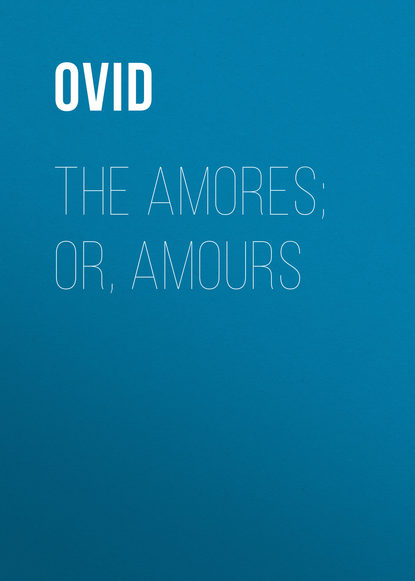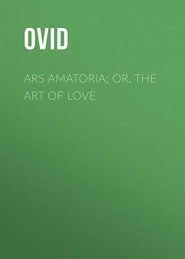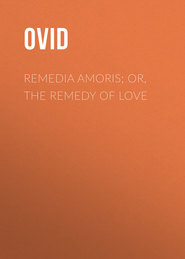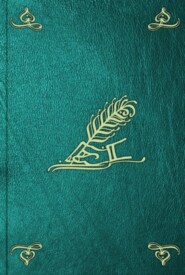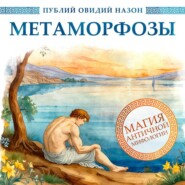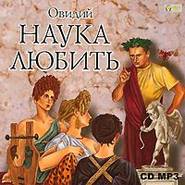По всем вопросам обращайтесь на: info@litportal.ru
(©) 2003-2024.
✖
The Amores; or, Amours
Настройки чтения
Размер шрифта
Высота строк
Поля
[ On his unsightly breast.—Ver. 36. This, from her position, if she reclined below her husband, she would be almost obliged to do.]
045 (return (#x1_x_1_i102))
[ So close at hand.—Ver. 37. A breach of these injunctions would imply either a very lax state of etiquette at the Reman parties, or, what is more probable, that the present company was not of a very select character.]
048 (return (#x1_x_1_i104))
[ Beneath the cloth.—Ver. 48. 'Vestis' means a covering, or clothing for anything, as for a couch, or for tapestry. Let us charitably suppose it here to mean the table cloth; as the passage will not admit of further examination, and has of necessity been somewhat modified in the translation.]
049 (return (#x1_x_1_i104))
[ The conscious covering.—Ver. 50. The 'pallia,' here mentioned, are clearly the coverlets of the couch which he has before mentioned in the 41st line; and from this it is evident, that during the repast the guests were covered with them.]
050 (return (#x1_x_1_i104))
[ Add wine by stealth.—Ver. 52. To make him fall asleep the sooner]
051 (return (#x1_x_1_i109))
[ 'Twas summer time.—Ver. 1. In all hot climates it is the custom to repose in the middle of the day. This the Spaniards call the 'siesta.']
053 (return (#x1_x_1_i109))
[ A part of the window.—Ver. 3. On the 'fenestræ,' or windows of the ancients, see the Notes to the Pontic Epistles, Book iii. Ep. iii. 1. 5, and to the Metamorphoses, Book xiv. 1. 752. He means that one leaf of the window was open, and one shut.]
054 (return (#x1_x_1_i110))
[ Corinna.—Ver. 9. In the Fourth Book of the Tristia, Elegy x. 1. GO, he says, 'Corinna, (so called by a fictitious name) the subject of song through the whole city, had imparted a stimulus to my geuius.' It has been supposed by some Commentators, that under this name he meant Julia, either the daughter or the grand-daughter of the emperor Augustus, but there seems really to be no ground for such a belief; indeed, the daughter of Augustus had passed middle age, when Ovid was still in boyhood. It is most probable that Corinna was ouly an ideal personage, existing in the imagination of the Poet; and that he intended the name to apply to his favourite mistress for the time being, as, though he occasionally denies it, still, at other times, he admits that his passion was of the roving kind. There are two females mentioned in history of the name of Coriuna. One was a Theban poetess, who excelled in Lyric composition, and was said to have vanquished Pindar himself in a Lyric contest; while the other was a native of Thespiæ, in Bceotia. 'The former, who was famous for both her personal charms and her mental endowments, is supposed to have suggested the use of the name to Ovid.]
055 (return (#x1_x_1_i110))
[ Clothed in a tunic.—Ver. 9. 'Tunica' was the name of the under-garment with both sexes among the Romans. When the wearer was out of doors, or away from home, it was fastened round the waist with a belt or girdle, but when at home and wishing to be entirely at ease, it was, as in the present instance, loose or ungirded. Both sexes usually wore two tunics. In female dress, Varro seems to call the outer tunic 'subucula,' and the 'interior tunica' by the name also of 'indusium.' The outer tunic was also called 'stola,' and, with the 'palla' completed the female dress. The 'tunica interior,' or what is here called tunica,' was a simple shift, and in early times had no sleeves. According to Nonius, it fitted loosely on the body, and was not girded when the 'stola' or outer tunic was put on. Poor people, who could not afford to purchase a 'toga,' wore the tunic alone; whence we find the lower classes called by the name of 'tunicati.']
056 (return (#x1_x_1_i110))
[ Her flowing hair.—Ver. 10. 'Dividuis,' here means, that her hair was scattered, flowing over her shoulders and not arranged on the head in a knot.]
057 (return (#x1_x_1_i111))
[ Semiramis.—Ver. 11. Semiramis was the wife of Ninus, king of Babylon, and was famous for her extreme beauty, and the talent which she displayed as a ruler. She was also as unscrupulous in her morals as the fair one whom the Poet is now describing.]
058 (return (#x1_x_1_i111))
[ And Lais.—Ver. 12. There are generally supposed to have beén two famous courtesans of the name of Lais. The first was carried captive, when a child, from Sicily, in the second year of the 91st Olympiad, and being taken to Corinth, became famous throughout Greece for her extreme beauty, and the high price she put upon her favours. Many of the richest and most learned men resorted to her, and became smitten by her charms. The second Lais was the daughter of Alcibiades, by his mistress, Timandra. When Demosthenes applied for a share of her favours, she made the extravagant demand of ten thousand drachmae, upon which, regaining his wisdom (which had certainly forsaken him for a time) he said that he would not purchase repentance at so high a price.]
059 (return (#x1_x_1_i111))
[ In its thinness.—Ver. 13. Possibly it was made of Coan cloth, if Corinna was as extravagant as she was vicious.]
060 (return (#x1_x_1_i116))
[ The cruel fetter—Ver. 1. Among the Romans, the porter was frequently bound by a chain to his post, that he might not forsake it.]
062 (return (#x1_x_1_i116))
[ Watches of the keepers.—Ver. 7. Properly, the 'excubiæ' were the military watches that were kept on guard, either by night or day, while the term 'vigiliæ,' was only applied to the watch by night. He here alludes to the watch kept by jealous men over their wives.]
063 (return (#x1_x_1_i116))
[ Spectres that flit by night.—Ver. 13. The dread of the ghosts of the departed entered largely among the Roman superstitions. See an account of the Ceremony, in the Fifth Book of the Fasti, 1. 422, et seq., for driving the ghosts, or Lemures, from the house.]
064 (return (#x1_x_1_i117))
[ Ready for the whip—Ver. 19. See the Note to the 81st line of the Epistle of De'ianira to Hercules. Ovid says, that he has often pleaded for him to his mistress; indeed, the Roman ladies often showed more cruelty to the slaves, both male and female, than the men did to the male slaves.]
065 (return (#x1_x_1_i117))
[ As you wish.—Ver. 28. Of course it would be the porter's wish that the night should pass quickly on, as he would be relieved in the morning, and was probably forbidden to sleep during the night.]
066 (return (#x1_x_1_i117))
[ Hours of the night pass on.—Ver. 24. This is an intercalary line, being repeated after each seventh one.]
067 (return (#x1_x_1_i117))
[ From the door-post.—Ver. 24. The fastenings of the Roman doors consisted of a bolt placed at the bottom of eacn 'foris,' or wing of the door, which fell into a socket made in the sill. By way of additional precaution, at night, the front door was secured by a bar of wood or iron, here called 'sera,' which ran across, and was inserted in sockets on each side of the doorway. Hence it was necessary to remove or strike away the bar, 'excutere seram,' before the door could be opened.]
068 (return (#x1_x_1_i117))
[ Water of the slave.—Ver. 26. Water was the principal beverage of the Roman slaves, but they were allowed a small quantity of wiue, which was increased on the Saturnalia. 'Far,' or 'spelt,' formed their general sustenance, of which they received one 'libra' daily. Salt and oil were also allowed them, and sometimes fruit, but seldom vegetables. Flesh meat seems not to have been given to them.]
069 (return (#x1_x_1_i118))
[ About my temples.—Ver. 37. 'Circa mea tempora,' literally, 'around my temples' This-expression is used, because it was supposed that the vapours of excessive wine affect the brain. He says that he has only taken a moderate quantity of wine, although the chaplet falling from off his hair would seem to bespeak the contrary.]
073 (return (#x1_x_1_i121))
[ Otherwise I myself!—Ver. 57. Heinsius thinks that this and the following line are spurious.]
074 (return (#x1_x_1_i121))
[ Holding in my torch—Ver. 58. Torches were usually carried by the Romans, for their guidance after sunset, and were generally made of wooden staves or twigs, bound by a rope around them, in a spiral form, or else by circular bands at equal distances. The inside of the torch was filled with flax, tow, or dead vegetable matter, impregnated with pitch, wax, rosin, oil, or other inflammable substances.]
075 (return (#x1_x_1_i121))
[ Love and wine.—Ver. 59. He seems, by this, to admit that he has taken more than a moderate quantity of wine, 'modicum vinum,' as he says above.]
076 (return (#x1_x_1_i122))
045 (return (#x1_x_1_i102))
[ So close at hand.—Ver. 37. A breach of these injunctions would imply either a very lax state of etiquette at the Reman parties, or, what is more probable, that the present company was not of a very select character.]
048 (return (#x1_x_1_i104))
[ Beneath the cloth.—Ver. 48. 'Vestis' means a covering, or clothing for anything, as for a couch, or for tapestry. Let us charitably suppose it here to mean the table cloth; as the passage will not admit of further examination, and has of necessity been somewhat modified in the translation.]
049 (return (#x1_x_1_i104))
[ The conscious covering.—Ver. 50. The 'pallia,' here mentioned, are clearly the coverlets of the couch which he has before mentioned in the 41st line; and from this it is evident, that during the repast the guests were covered with them.]
050 (return (#x1_x_1_i104))
[ Add wine by stealth.—Ver. 52. To make him fall asleep the sooner]
051 (return (#x1_x_1_i109))
[ 'Twas summer time.—Ver. 1. In all hot climates it is the custom to repose in the middle of the day. This the Spaniards call the 'siesta.']
053 (return (#x1_x_1_i109))
[ A part of the window.—Ver. 3. On the 'fenestræ,' or windows of the ancients, see the Notes to the Pontic Epistles, Book iii. Ep. iii. 1. 5, and to the Metamorphoses, Book xiv. 1. 752. He means that one leaf of the window was open, and one shut.]
054 (return (#x1_x_1_i110))
[ Corinna.—Ver. 9. In the Fourth Book of the Tristia, Elegy x. 1. GO, he says, 'Corinna, (so called by a fictitious name) the subject of song through the whole city, had imparted a stimulus to my geuius.' It has been supposed by some Commentators, that under this name he meant Julia, either the daughter or the grand-daughter of the emperor Augustus, but there seems really to be no ground for such a belief; indeed, the daughter of Augustus had passed middle age, when Ovid was still in boyhood. It is most probable that Corinna was ouly an ideal personage, existing in the imagination of the Poet; and that he intended the name to apply to his favourite mistress for the time being, as, though he occasionally denies it, still, at other times, he admits that his passion was of the roving kind. There are two females mentioned in history of the name of Coriuna. One was a Theban poetess, who excelled in Lyric composition, and was said to have vanquished Pindar himself in a Lyric contest; while the other was a native of Thespiæ, in Bceotia. 'The former, who was famous for both her personal charms and her mental endowments, is supposed to have suggested the use of the name to Ovid.]
055 (return (#x1_x_1_i110))
[ Clothed in a tunic.—Ver. 9. 'Tunica' was the name of the under-garment with both sexes among the Romans. When the wearer was out of doors, or away from home, it was fastened round the waist with a belt or girdle, but when at home and wishing to be entirely at ease, it was, as in the present instance, loose or ungirded. Both sexes usually wore two tunics. In female dress, Varro seems to call the outer tunic 'subucula,' and the 'interior tunica' by the name also of 'indusium.' The outer tunic was also called 'stola,' and, with the 'palla' completed the female dress. The 'tunica interior,' or what is here called tunica,' was a simple shift, and in early times had no sleeves. According to Nonius, it fitted loosely on the body, and was not girded when the 'stola' or outer tunic was put on. Poor people, who could not afford to purchase a 'toga,' wore the tunic alone; whence we find the lower classes called by the name of 'tunicati.']
056 (return (#x1_x_1_i110))
[ Her flowing hair.—Ver. 10. 'Dividuis,' here means, that her hair was scattered, flowing over her shoulders and not arranged on the head in a knot.]
057 (return (#x1_x_1_i111))
[ Semiramis.—Ver. 11. Semiramis was the wife of Ninus, king of Babylon, and was famous for her extreme beauty, and the talent which she displayed as a ruler. She was also as unscrupulous in her morals as the fair one whom the Poet is now describing.]
058 (return (#x1_x_1_i111))
[ And Lais.—Ver. 12. There are generally supposed to have beén two famous courtesans of the name of Lais. The first was carried captive, when a child, from Sicily, in the second year of the 91st Olympiad, and being taken to Corinth, became famous throughout Greece for her extreme beauty, and the high price she put upon her favours. Many of the richest and most learned men resorted to her, and became smitten by her charms. The second Lais was the daughter of Alcibiades, by his mistress, Timandra. When Demosthenes applied for a share of her favours, she made the extravagant demand of ten thousand drachmae, upon which, regaining his wisdom (which had certainly forsaken him for a time) he said that he would not purchase repentance at so high a price.]
059 (return (#x1_x_1_i111))
[ In its thinness.—Ver. 13. Possibly it was made of Coan cloth, if Corinna was as extravagant as she was vicious.]
060 (return (#x1_x_1_i116))
[ The cruel fetter—Ver. 1. Among the Romans, the porter was frequently bound by a chain to his post, that he might not forsake it.]
062 (return (#x1_x_1_i116))
[ Watches of the keepers.—Ver. 7. Properly, the 'excubiæ' were the military watches that were kept on guard, either by night or day, while the term 'vigiliæ,' was only applied to the watch by night. He here alludes to the watch kept by jealous men over their wives.]
063 (return (#x1_x_1_i116))
[ Spectres that flit by night.—Ver. 13. The dread of the ghosts of the departed entered largely among the Roman superstitions. See an account of the Ceremony, in the Fifth Book of the Fasti, 1. 422, et seq., for driving the ghosts, or Lemures, from the house.]
064 (return (#x1_x_1_i117))
[ Ready for the whip—Ver. 19. See the Note to the 81st line of the Epistle of De'ianira to Hercules. Ovid says, that he has often pleaded for him to his mistress; indeed, the Roman ladies often showed more cruelty to the slaves, both male and female, than the men did to the male slaves.]
065 (return (#x1_x_1_i117))
[ As you wish.—Ver. 28. Of course it would be the porter's wish that the night should pass quickly on, as he would be relieved in the morning, and was probably forbidden to sleep during the night.]
066 (return (#x1_x_1_i117))
[ Hours of the night pass on.—Ver. 24. This is an intercalary line, being repeated after each seventh one.]
067 (return (#x1_x_1_i117))
[ From the door-post.—Ver. 24. The fastenings of the Roman doors consisted of a bolt placed at the bottom of eacn 'foris,' or wing of the door, which fell into a socket made in the sill. By way of additional precaution, at night, the front door was secured by a bar of wood or iron, here called 'sera,' which ran across, and was inserted in sockets on each side of the doorway. Hence it was necessary to remove or strike away the bar, 'excutere seram,' before the door could be opened.]
068 (return (#x1_x_1_i117))
[ Water of the slave.—Ver. 26. Water was the principal beverage of the Roman slaves, but they were allowed a small quantity of wiue, which was increased on the Saturnalia. 'Far,' or 'spelt,' formed their general sustenance, of which they received one 'libra' daily. Salt and oil were also allowed them, and sometimes fruit, but seldom vegetables. Flesh meat seems not to have been given to them.]
069 (return (#x1_x_1_i118))
[ About my temples.—Ver. 37. 'Circa mea tempora,' literally, 'around my temples' This-expression is used, because it was supposed that the vapours of excessive wine affect the brain. He says that he has only taken a moderate quantity of wine, although the chaplet falling from off his hair would seem to bespeak the contrary.]
073 (return (#x1_x_1_i121))
[ Otherwise I myself!—Ver. 57. Heinsius thinks that this and the following line are spurious.]
074 (return (#x1_x_1_i121))
[ Holding in my torch—Ver. 58. Torches were usually carried by the Romans, for their guidance after sunset, and were generally made of wooden staves or twigs, bound by a rope around them, in a spiral form, or else by circular bands at equal distances. The inside of the torch was filled with flax, tow, or dead vegetable matter, impregnated with pitch, wax, rosin, oil, or other inflammable substances.]
075 (return (#x1_x_1_i121))
[ Love and wine.—Ver. 59. He seems, by this, to admit that he has taken more than a moderate quantity of wine, 'modicum vinum,' as he says above.]
076 (return (#x1_x_1_i122))





